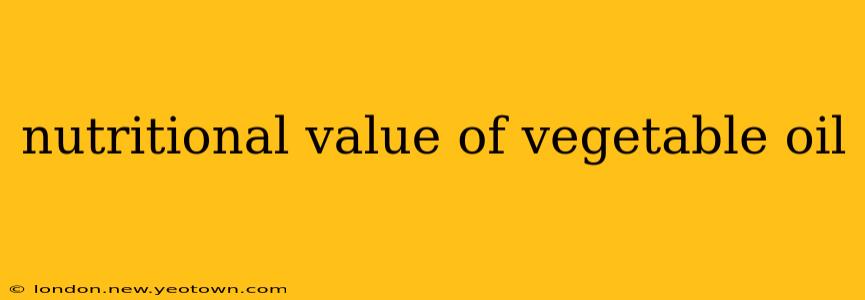Unpacking the Nutritional Value of Vegetable Oil: More Than Just Cooking
Vegetable oil. We use it daily, drizzling it on salads, sautéing our vegetables, or baking our favorite treats. But how much do we really know about its nutritional value? It's more complex than a simple "good" or "bad" label. Let's delve into the fascinating world of vegetable oil, exploring its composition and uncovering its surprising nutritional nuances.
My name is Anya Petrova, and I've spent years researching the impact of dietary fats on overall health. I'm passionate about demystifying complex nutritional topics, making them accessible and understandable for everyone.
Our journey begins with understanding that "vegetable oil" is a broad term encompassing oils extracted from various plants, each with a unique profile of fatty acids. These fatty acids are the building blocks of the oil, influencing its properties and nutritional value.
What are the main types of fatty acids in vegetable oils?
Vegetable oils primarily contain three types of fatty acids:
-
Monounsaturated fatty acids (MUFAs): These are generally considered heart-healthy. Oils rich in MUFAs include olive oil and avocado oil. They can help lower LDL ("bad") cholesterol levels.
-
Polyunsaturated fatty acids (PUFAs): This category includes omega-3 and omega-6 fatty acids. Omega-3s, found in flaxseed oil and some others, are known for their anti-inflammatory properties. Omega-6s are also important, but an overabundance in the diet, relative to omega-3s, is linked to inflammation.
-
Saturated fatty acids (SFAs): These are often viewed negatively, but in moderation, they're a necessary part of a balanced diet. Coconut oil is high in SFAs. The impact of SFAs on health is a complex area of ongoing research.
The specific ratio of these fatty acids varies considerably across different vegetable oils. For example, olive oil is predominantly monounsaturated, while soybean oil is rich in polyunsaturated fats. This difference impacts their nutritional profiles and how they might affect your health.
Does vegetable oil contain vitamins and minerals?
While vegetable oils aren't significant sources of vitamins and minerals compared to fruits and vegetables, some refined vegetable oils may contain small amounts of vitamin E, a powerful antioxidant. However, processing methods can significantly affect the vitamin content. The vitamins and minerals we obtain from our diets mostly come from fruits, vegetables, legumes, whole grains and other foods.
What are the potential health benefits of vegetable oil?
Many vegetable oils offer potential health benefits when consumed as part of a balanced diet. Their role in providing essential fatty acids is crucial, contributing to various bodily functions.
-
Heart Health: Oils rich in MUFAs, like olive oil, can contribute to a heart-healthy diet by lowering LDL cholesterol levels.
-
Brain Function: Omega-3 fatty acids found in certain vegetable oils are essential for brain health and development.
-
Anti-inflammatory Effects: Omega-3s possess anti-inflammatory properties, which may help reduce the risk of chronic diseases.
It’s important to remember that these benefits are associated with moderate consumption as part of a balanced, overall healthy diet.
Is all vegetable oil the same? What are the differences between different types?
Absolutely not! The nutritional profile varies drastically depending on the source plant. Olive oil, for instance, boasts a higher concentration of monounsaturated fats and offers distinct health benefits compared to soybean oil, which is richer in polyunsaturated fats. Even within a type, like sunflower oil, different processing methods can alter the fatty acid composition and nutritional value. Reading labels carefully is essential.
Are there any health risks associated with consuming vegetable oil?
Excessive consumption of any oil, including vegetable oil, can lead to weight gain due to its high caloric density. Some processed vegetable oils may contain high levels of omega-6 fatty acids, and an imbalance between omega-6 and omega-3 intake may contribute to inflammation. Furthermore, the potential effects of certain processing methods on oil quality and health implications are currently under investigation.
How can I incorporate vegetable oil into a healthy diet?
The key is moderation and variety. Instead of relying on one type of vegetable oil exclusively, incorporate a variety into your cooking. Use oils rich in monounsaturated fats, like olive oil and avocado oil, for salads and dressings. Select oils wisely, considering their fatty acid profiles, and always prioritize a balanced diet rich in fruits, vegetables, whole grains, and lean protein.
In conclusion, the nutritional value of vegetable oil is multifaceted and depends heavily on the type of oil and its processing methods. Understanding the different fatty acid profiles and incorporating a variety of healthy oils into a balanced diet is key to reaping their nutritional benefits while minimizing potential risks. Remember that moderation and mindful consumption are crucial for overall health.

